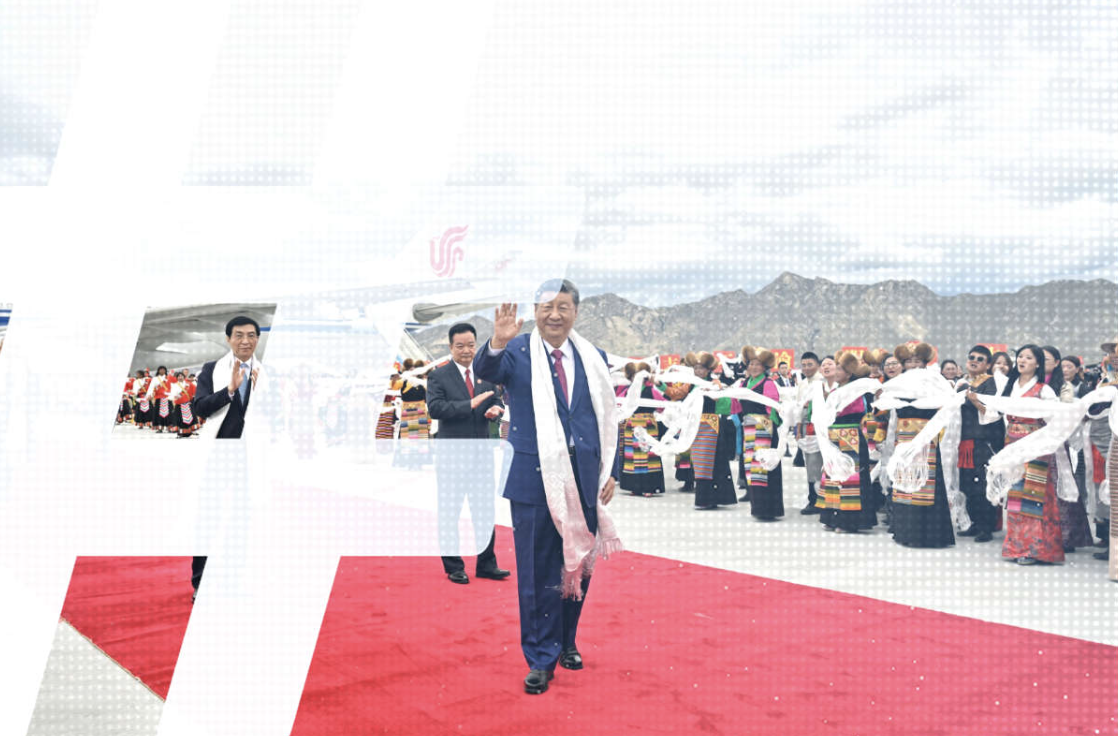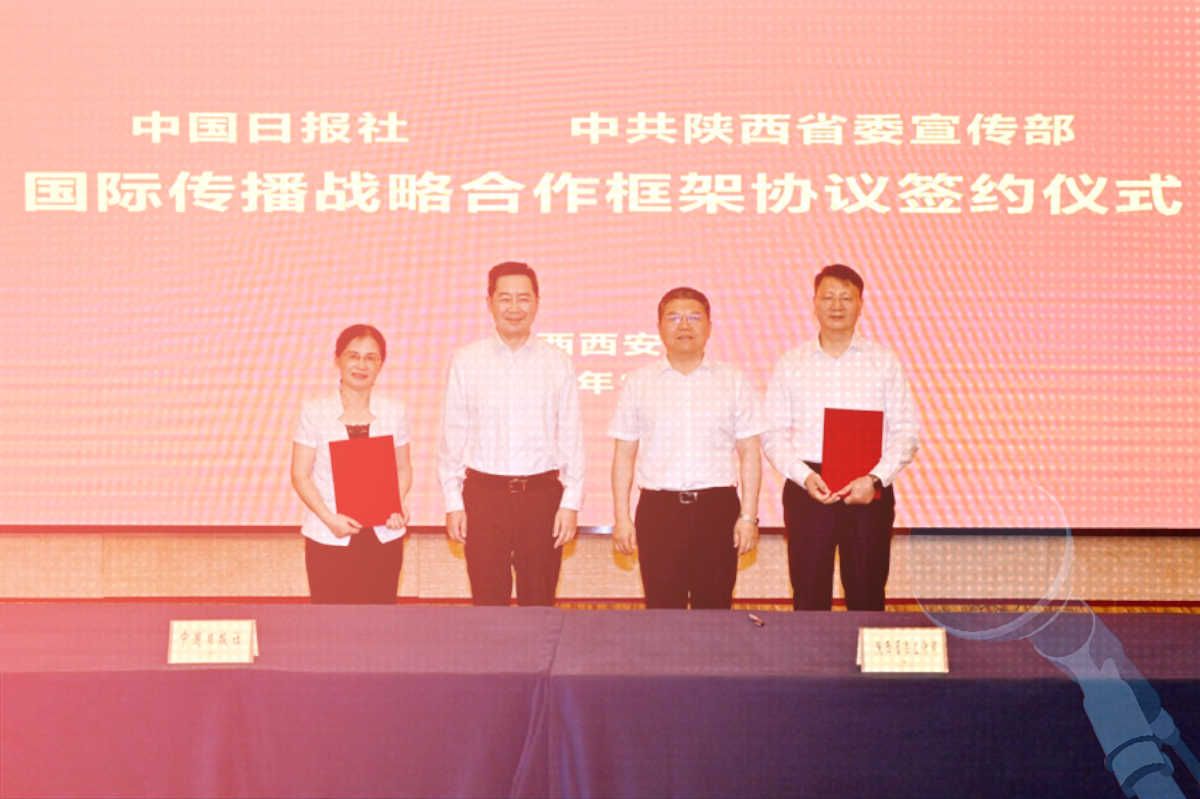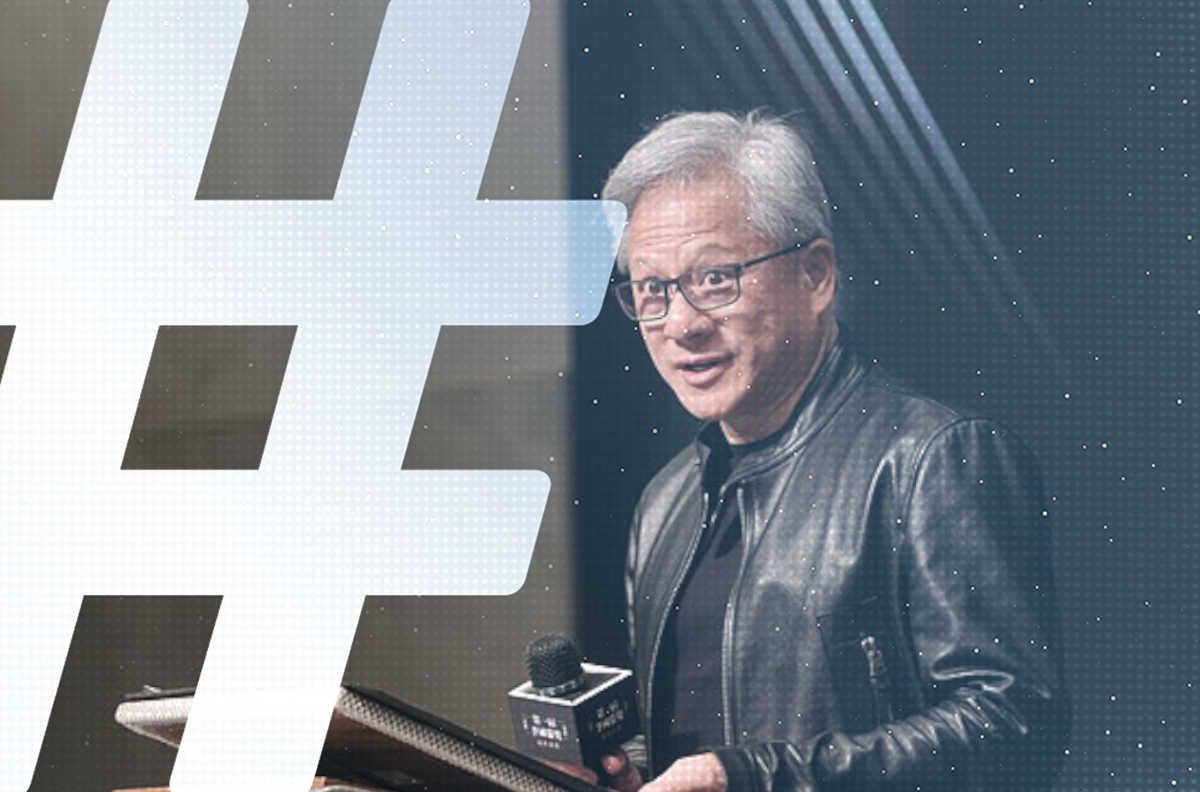Headlines and Hashtags
China quiet on bad eggs as the premier talks tough on safety
By David Bandurski — As China’s poison milk scandal refused to slip into the past this weekend, Wen Jiabao promised a strong new approach to food safety issues. Addressing the Asia-Europe summit meeting on Saturday, Wen said China was pushing through a food safety law that would prohibit addition of harmful chemicals in foods and empower the government to “ban the sale of and recall unsafe food products if companies fail to do so voluntarily after products are found to be contaminated.” [Frontpage image by Darren Hester available at Flickr.com under Creative Commons license.]
The new law, it seems, cannot come quickly enough.
China’s latest melamine-tainted food incident — this time affecting chicken eggs and related products — has quietly emerged over the past ten days. Even as it is beleaguered with recalls from three neighboring economies, however, China’s largest egg products manufacturer, Dalian Hanwei Enterprise Group, has failed to announce its own recalls or to explain publicly what action it is taking.
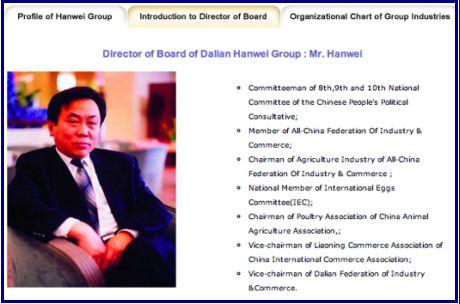
[ABOVE: Screenshot of Han Wei profile available at Dalian Hanwei’s official website.]
As Wen Jiabao’s tough talk at the Saturday summit was relayed by media inside and outside China authorities in Hong Kong announced that chicken eggs imported from China were contaminated with melamine, the chemical at the center of the recent dairy scandal. Hong Kong, which hypothesized that melamine contamination might have stemmed from chicken feed, said it would expand testing to include meat products.
But so far, China’s government has responded to problems in the egg products industry with resounding silence, even while these problems point potentially to more widespread melamine contamination.
This was not the first hint of trouble. Japan’s Yomiuri Shinbun reported back on October 17 that importer Mitsui & Co. had found melamine in egg powder imported from China. And South Korea destroyed 23 tons of Chinese egg products on October 22 after detecting excessive levels of the chemical. In both cases, tainted egg products were slated for use, or were used, in a variety of downstream food products, including baked goods.
But neither the Japanese nor the South Korean recalls were reported in China, and so far coverage of Hong Kong’s announcement in China’s media is sparse, pointing to possible propaganda directions on reporting (we are in the process of checking with sources).
The prize for timely and comprehensive reporting goes to the online edition of Caijing magazine, which reported the full story yesterday and mentioned other product recalls in Japan and Taiwan.
The first and only print media to report yesterday on Hong Kong’s testing of melamine-tainted eggs were Guangzhou’s Southern Metropolis Daily and Yangcheng Evening News, both commercial newspapers. Unlike the Caijing online report, neither story named Dalian Hanwei, the Chinese conglomerate whose products are at the center of recalls in Japan, South Korea and Hong Kong.
This important omission was all too reminiscent of the early stages of the milk powder scandal, in which Sanlu Group, the company most directly implicated, was spared mention.
Southern Metropolis Daily did report yesterday, however, that the eggs were produced in Dalian.
[PG11 of the October 26 edition of the Shenzhen city section of Southern Metropolis Daily, article on eggs at top.]
According to our database search, thirty local commercial newspapers reported today on the discovery in Hong Kong of melamine-tainted eggs from the mainland. Nearly all of the reports were sourced from either Guangzhou’s Yangcheng Evening News, Southern Metropolis Daily or Guangzhou Daily, but only sixteen mentioned Dalian Hanwei by name.
Only two brief news reports based on Hong Kong sources appear in provincial or national party media today, but neither make mention of Dalian Hanwei. These are from Nanfang Daily, the official party mouthpiece of top leaders in Guangdong, and from the online site of the official Xinhua News Agency.
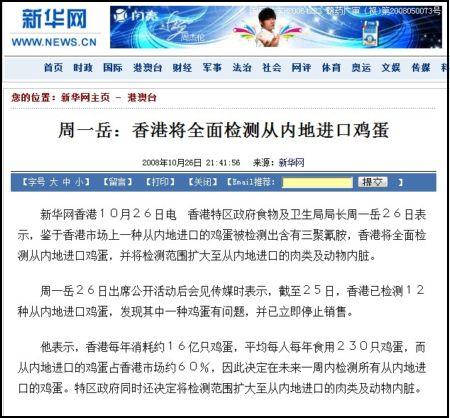
[ABOVE: Screenshot of Hong Kong egg recall coverage at the Xinhua News Agency website.]
It is worth nothing, however, that Nanfang Daily gave the story reasonably prominent positioning on the front page:
Guangzhou Daily, one of China’s more commercially oriented party dailies, reported more extensively on Hong Kong’s recall today, mentioning Dalian Hanwei by name. Other commercial papers, including Shanghai’s Oriental Daily, ran the Guangzhou Daily version.
It is interesting to note that while Shenzhen-based QQ.com promoted the story of the Hong Kong announcement to the top of its news page today and gave it the most prominent headline, like this . . .
. . . Beijing-based Sina.com and Sohu.com gave the story slightly less emphasis.
[ABOVE: Screenshot of Sina.com.cn news page at 4:35pm, October 27, 2008]
[ABOVE: Screenshot of Sohu.com news page at 4:45pm, October 27, 2008]
Reports in China’s media today could mean the story is beginning to stick, and that a response from the government and/or Dalian Hanwei is forthcoming. Certainly, the news in commercial media and on Web portals today should be enough to get Chinese consumers thinking: Hey, what’s being done about this?
Comments on the news at QQ.com are worth a browse for readers of Chinese.
But the situation is also eerily reminiscent so far of last month’s milk powder scandal, in which the powerful Sanlu Group was initially shielded from scrutiny. More critically, again, there is no indication from the government about what is being done to address consumer safety on this issue.
It is also worth noting a number of further reasons why this latest turn in China’s ongoing food scandal is particularly of interest.
1. The announcements from Japan, South Korea and Hong Kong point to deeper contamination of food products in China, impacting entire production chains.
2. As this article from the recent issue of Study Times affirms, Hu Jintao pledged back on April 2008 that China would “raise the effectiveness of news, reporting at the first available moment” and “increase the transparency of news reporting, not covering up public incidents” (公共事件). What exactly was the first available moment here? News of contaminated eggs goes back at least to October 17, but there has not yet been an official statement and a handul of commercial media (with rare exceptions) are taking the lead only today in regurgitating Hong Kong news.
3. Han Wei, the founder of Dalian Hanwei, is an influential political player (a CPPCC delegate and vice-chairman of the Dalian Federation of Industry and Commerce) and is widely regarded as an inspirational entrepreneur and a role model in the push for rural development. In May this year, Han Wei addressed a United Nations panel on sustainable development. Han is arguably a much better connected individual than the top dogs at Sanlu Group were pre-scandal.
Han Wei has been called China’s “king of hens.” Here he is back in June 2005 talking with China International Radio about his “Ge Ge Da” brand of chicken eggs and what makes them the “finest quality possible”:
We really do a lot to ensure the eggs’ quality. The most important thing is to monitor the quality during the entire process from the ground to the dinner table. First the feed we buy must be healthy, without any harmful additives.
4. Some of the problem products in question were apparently manufactured by Dalian Hanwei Food Co. Ltd, a joint venture between Dalian Hanwei and Denmark’s Sanovo, although this needs to be confirmed. Reports from RRT News and Reuters suggest the joint venture is the source of problem products. So far, however, Sanovo has not responded to recalls in Asia. [More on the joint venture from the Dalian government website].
5. Eggs were actively touted and actively consumed by many Chinese as a safe alternative source of nutrition for adults and children during the recent milk scandal. Check out articles making dietary recommendations like this one, this one (graf six), and this one from Peoples Daily Online, recommending an egg a day.
FURTHER SOURCES:
“Premier says China to ensure safe food,” Associated Press, October 26, 2008
“Hong Kong tests more China food after egg scare,” Associated Press, October 26, 2008
“Premier says China to ensure safe food,” AP via MSNBC, October 26, 2008
Caijing online reporting on melamine contaminated eggs, October 26, 2008
“Good Mountains, Good Water, Good Eggs,” Hexun (Chinese), August 2008
[Posted by David Bandurski, October 27, 2008, 2:53pm]















